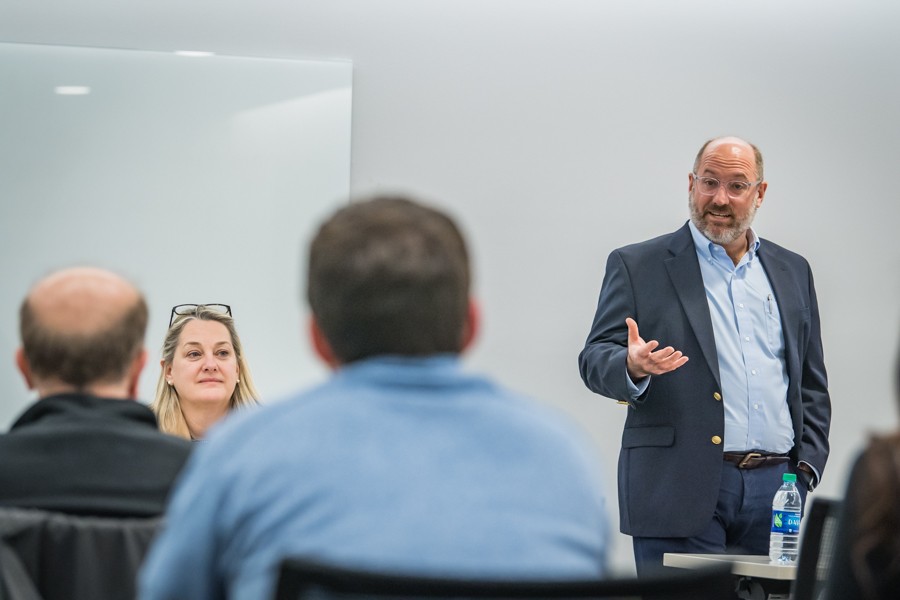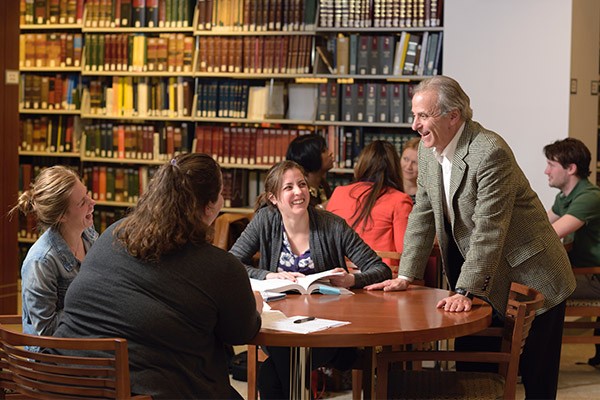The CPS Paralegal Professional Certificate Program Provides a Pathway to a Career in Law

In an ever-changing job market, diving into a new industry or career path can feel daunting. That can feel especially true in an industry with a high barrier to entry that can feel like entering another world.
For those looking to kickstart a career in the legal profession, beginning as a paralegal is a logical first step, yet even that step can feel monumental.
The Paralegal Professional Certificate program at Villanova University’s College of Professional Studies (CPS) seeks to help prospective paralegals and legal aids make that leap and do so rather quickly.
“Working in law is like learning another language. Our program introduces you to that language,” said Matt Carluzzo, JD, the Assistant Dean of Students and Academic Success at the Charles Widger School of Law and the program coordinator for the CPS Paralegal program. “It’s not designed to give you complete fluency, but instead gives you the ability to hit the ground running when you start working in the legal environment.”
Carluzzo, a lawyer and former paralegal himself, has been working with the CPS Paralegal program since 2016 and has seen the effects it has had on aspiring legal professionals.
“No one walks into a paralegal job knowing exactly what to do. Instead, there is an expectation the job will train you for your role moving forward. But what our program does is give you a major head start, leg up, and advantage in that training,” he told us recently.
THE PROGRAM
Importantly, the CPS Paralegal program is certified by the American Bar Association (ABA), making it even more attractive for potential students and their future employers.
“The ABA, which certifies lawyers across the nation, is giving our institution its stamp of approval,” explained Elizabeth Remelius, the Assistant Director of Professional Education in CPS. “If a student were looking for a job in Iowa, for example, that ABA approval matters just as much as it does locally."
Along with the ABA’s approval, the CPS Paralegal program boasts a well-rounded faculty that bring a diverse array of legal experience to the classroom.
“Our faculty are really dedicated and have tremendous legal backgrounds, as either attorneys or practicing paralegals,” said Carluzzo.
TWO WAYS TO STUDY
The program is offered as both an in-person, full-time experience during the day or as a part-time online program offered during the evening. Both programs offer the same rigorous structure, featuring 15 classes that cover a wide swath of legal topics.
The full-time program, completed weekdays over the course of one semester, is ideal for recent college graduates or career changers with the flexibility to deep dive into the in-person classes.
“It allows for an intimate connection to the faculty and your classmates,” Carluzzo explained. “It’s fast. If you know you want to pursue a paralegal career and you have the time to dedicate, it is a quick way to get up to speed and into the job market.”

The part-time program is offered in the evenings online, with three hour-and-a-half synchronous sessions each week, and an additional hour-and-a-half of course work to be completed on the students’ own schedule. This alternative makes sense for students with a different schedule or priorities at the time.
“Not everyone has the luxury to dedicate full-time to an educational program. There’s jobs, families, and life,” Carluzzo said. “We’re finding new ways to make the program feel like the Villanova experience. It’s something we are conscious to take into every new cohort.”
The two options within the program offer unique benefits to students. While the full-time cohorts get the chance to network with one another and their professors face-to-face, the evening cohorts often feature students from outside the Greater Philadelphia area, who can bring real life examples from a variety of jurisdictions to class.
“When people hear Villanova, they expect academic rigor,” Remelius said. “People across both (on campus and online) cohorts would certainly agree that the curriculum is rigorous. While they aren’t coming out with a deep understanding of every specific type of law, they are able to have intelligent conversations with experts in each of those fields.”
NEXT STEPS
No matter which version of the program a student completes, recent history has shown that they are in great position to find a place as paralegal.
“From both our most recent full-time in person and part-time online cohorts, we’re seeing 75 percent of the group already employed in the legal field, with some others choosing to continue to law school,” Remelius told us.
Carluzzo echoed that, saying, “(Law firms) can’t hire fast enough and have lots of applicants coming in, but not all of them have the Villanova education that lets an employer know their new hire isn’t starting from scratch.”
That level of connection between the CPS Paralegal program and law firms, especially those in the Philadelphia area, has been fruitful for students completing the program.
“We have a lot of local law firms that come to us directly so we can post the job for our paralegal grads to see,” said Remelius.
The demand for educated, ready-to-hire professionals in the paralegal role has been clear.
“The constant feedback we’re heard from attorneys and law firms is that the office does not run without paralegals.”
